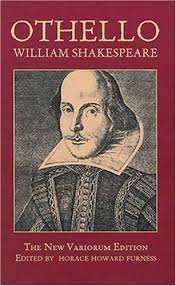Othello Page #3
Othello is a tragedy by William Shakespeare, believed to have been written in 1603. It is based on the story Un Capitano Moro by Cinthio, a disciple of Boccaccio, first published in 1565.
Duke. Now? What's the businesse? Sailor. The Turkish Preparation makes for Rhodes, So was I bid report here to the State, By Signior Angelo Duke. How say you by this change? 1.Sen. This cannot be By no assay of reason. 'Tis a Pageant To keepe vs in false gaze, when we consider Th' importancie of Cyprus to the Turke; And let our selues againe but vnderstand, That as it more concernes the Turke then Rhodes, So may he with more facile question beare it, For that it stands not in such Warrelike brace, But altogether lackes th' abilities That Rhodes is dress'd in. If we make thought of this, We must not thinke the Turke is so vnskillfull, To leaue that latest, which concernes him first, Neglecting an attempt of ease, and gaine To wake, and wage a danger profitlesse Duke. Nay, in all confidence he's not for Rhodes Officer. Here is more Newes. Enter a Messenger. Messen. The Ottamites, Reueren'd, and Gracious, Steering with due course toward the Ile of Rhodes, Haue there inioynted them with an after Fleete 1.Sen. I, so I thought: how many, as you guesse? Mess. Of thirtie Saile: and now they do re-stem Their backward course, bearing with frank appearance Their purposes toward Cyprus. Signior Montano, Your trustie and most Valiant Seruitour, With his free dutie, recommends you thus, And prayes you to beleeue him Duke. 'Tis certaine then for Cyprus: Marcus Luccicos is not he in Towne? 1.Sen. He's now in Florence Duke. Write from vs, To him, Post, Post-haste, dispatch 1.Sen. Here comes Brabantio, and the Valiant Moore. Enter Brabantio, Othello, Cassio, Iago, Rodorigo, and Officers. Duke. Valiant Othello, we must straight employ you, Against the generall Enemy Ottoman. I did not see you: welcome gentle Signior, We lack't your Counsaile, and your helpe to night Bra. So did I yours: Good your Grace pardon me. Neither my place, nor ought I heard of businesse Hath rais'd me from my bed; nor doth the generall care Take hold on me. For my perticular griefe Is of so flood-gate, and ore-bearing Nature, That it engluts, and swallowes other sorrowes, And it is still it selfe Duke. Why? What's the matter? Bra. My Daughter: oh my Daughter! Sen. Dead? Bra. I, to me. She is abus'd, stolne from me, and corrupted By Spels, and Medicines, bought of Mountebanks; For Nature, so prepostrously to erre, (Being not deficient, blind, or lame of sense,) Sans witch-craft could not Duke. Who ere he be, that in this foule proceeding Hath thus beguil'd your Daughter of her selfe, And you of her; the bloodie Booke of Law, You shall your selfe read, in the bitter letter, After your owne sense: yea, though our proper Son Stood in your Action Bra. Humbly I thanke your Grace, Here is the man; this Moore, whom now it seemes Your speciall Mandate, for the State affaires Hath hither brought All. We are verie sorry for't Duke. What in your owne part, can you say to this? Bra. Nothing, but this is so Othe. Most Potent, Graue, and Reueren'd Signiors, My very Noble, and approu'd good Masters; That I haue tane away this old mans Daughter, It is most true: true I haue married her; The verie head, and front of my offending, Hath this extent; no more. Rude am I, in my speech, And little bless'd with the soft phrase of Peace; For since these Armes of mine, had seuen yeares pith, Till now, some nine Moones wasted, they haue vs'd Their deerest action, in the Tented Field: And little of this great world can I speake, More then pertaines to Feats of Broiles, and Battaile, And therefore little shall I grace my cause, In speaking for my selfe. Yet, (by your gratious patience) I will a round vn-varnish'd Tale deliuer, Of my whole course of Loue. What Drugges, what Charmes, What Coniuration, and what mighty Magicke, (For such proceeding I am charg'd withall) I won his Daughter Bra. A Maiden, neuer bold: Of Spirit so still, and quiet, that her Motion Blush'd at her selfe, and she, in spight of Nature, Of Yeares, of Country, Credite, euery thing To fall in Loue, with what she fear'd to looke on; It is a iudgement main'd, and most imperfect. That will confesse Perfection so could erre Against all rules of Nature, and must be driuen To find out practises of cunning hell Why this should be. I therefore vouch againe, That with some Mixtures, powrefull o're the blood, Or with some Dram, (coniur'd to this effect) He wrought vpon her. To vouch this, is no proofe, Without more wider, and more ouer Test Then these thin habits, and poore likely-hoods Of moderne seeming, do prefer against him Sen. But Othello, speake, Did you, by indirect, and forced courses Subdue, and poyson this yong Maides affections? Or came it by request, and such faire question As soule, to soule affordeth? Othel. I do beseech you, Send for the Lady to the Sagitary, And let her speake of me before her Father; If you do finde me foule, in her report, The Trust, the Office, I do hold of you, Not onely take away, but let your Sentence Euen fall vpon my life Duke. Fetch Desdemona hither Othe. Aunciant, conduct them: You best know the place. And tell she come, as truely as to heauen, I do confesse the vices of my blood, So iustly to your Graue eares, Ile present How I did thriue in this faire Ladies loue, And she in mine Duke. Say it Othello Othe. Her Father lou'd me, oft inuited me: Still question'd me the Storie of my life, From yeare to yeare: the Battaile, Sieges, Fortune, That I haue past. I ran it through, euen from my boyish daies, Toth' very moment that he bad me tell it. Wherein I spoke of most disastrous chances: Of mouing Accidents by Flood and Field, Of haire-breadth scapes i'th' imminent deadly breach; Of being taken by the Insolent Foe, And sold to slauery. Of my redemption thence, And portance in my Trauellours historie. Wherein of Antars vast, and Desarts idle, Rough Quarries, Rocks, Hills, whose head touch heauen, It was my hint to speake. Such was my Processe, And of the Canibals that each others eate, The Antropophague, and men whose heads Grew beneath their shoulders. These things to heare, Would Desdemona seriously incline: But still the house Affaires would draw her hence: Which euer as she could with haste dispatch, She'l'd come againe, and with a greedie eare Deuoure vp my discourse. Which I obseruing, Tooke once a pliant houre, and found good meanes To draw from her a prayer of earnest heart, That I would all my Pilgrimage dilate, Whereof by parcels she had something heard, But not instinctiuely: I did consent, And often did beguile her of her teares, When I did speake of some distressefull stroke That my youth suffer'd: My Storie being done, She gaue me for my paines a world of kisses: She swore in faith 'twas strange: 'twas passing strange, 'Twas pittifull: 'twas wondrous pittifull. She wish'd she had not heard it, yet she wish'd That Heauen had made her such a man. She thank'd me, And bad me, if I had a Friend that lou'd her, I should but teach him how to tell my Story, And that would wooe her. Vpon this hint I spake, She lou'd me for the dangers I had past, And I lou'd her, that she did pitty them. This onely is the witch-craft I haue vs'd. Here comes the Ladie: Let her witnesse it.
Translation
Translate and read this book in other languages:
Select another language:
- - Select -
- 简体中文 (Chinese - Simplified)
- 繁體中文 (Chinese - Traditional)
- Español (Spanish)
- Esperanto (Esperanto)
- 日本語 (Japanese)
- Português (Portuguese)
- Deutsch (German)
- العربية (Arabic)
- Français (French)
- Русский (Russian)
- ಕನ್ನಡ (Kannada)
- 한국어 (Korean)
- עברית (Hebrew)
- Gaeilge (Irish)
- Українська (Ukrainian)
- اردو (Urdu)
- Magyar (Hungarian)
- मानक हिन्दी (Hindi)
- Indonesia (Indonesian)
- Italiano (Italian)
- தமிழ் (Tamil)
- Türkçe (Turkish)
- తెలుగు (Telugu)
- ภาษาไทย (Thai)
- Tiếng Việt (Vietnamese)
- Čeština (Czech)
- Polski (Polish)
- Bahasa Indonesia (Indonesian)
- Românește (Romanian)
- Nederlands (Dutch)
- Ελληνικά (Greek)
- Latinum (Latin)
- Svenska (Swedish)
- Dansk (Danish)
- Suomi (Finnish)
- فارسی (Persian)
- ייִדיש (Yiddish)
- հայերեն (Armenian)
- Norsk (Norwegian)
- English (English)
Citation
Use the citation below to add this book to your bibliography:
Style:MLAChicagoAPA
"Othello Books." Literature.com. STANDS4 LLC, 2024. Web. 22 Dec. 2024. <https://www.literature.com/book/othello_14>.




Discuss this Othello book with the community:
Report Comment
We're doing our best to make sure our content is useful, accurate and safe.
If by any chance you spot an inappropriate comment while navigating through our website please use this form to let us know, and we'll take care of it shortly.
Attachment
You need to be logged in to favorite.
Log In